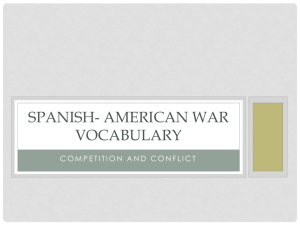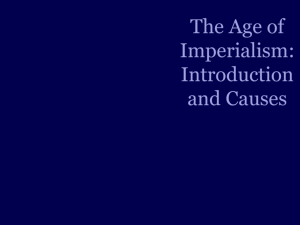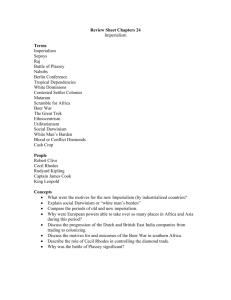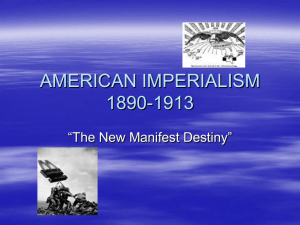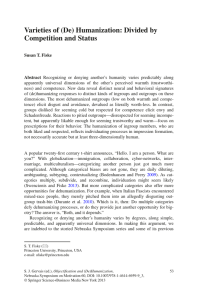New Imperialism Power point
advertisement
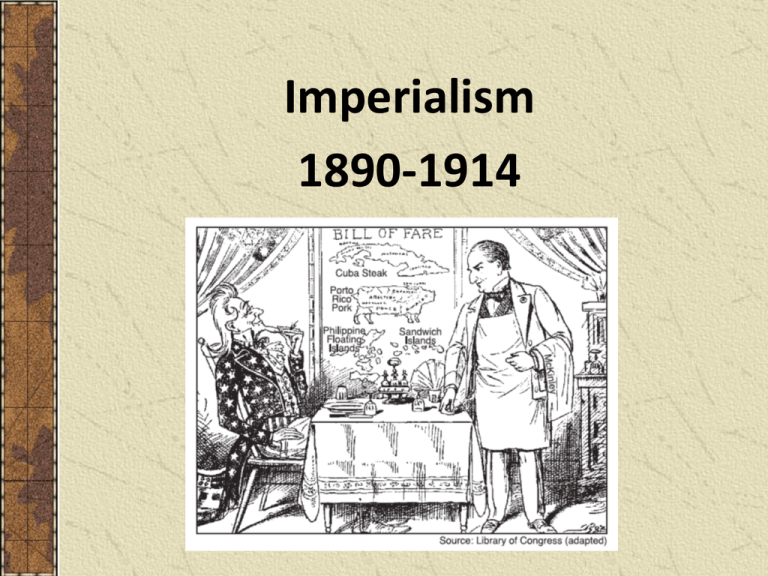
Imperialism 1890-1914 Imperialism The system by which great powers gain control of overseas territories. The U.S. became an imperialist power by gaining control of Puerto Rico, Guam, the Philippines and Cuba as a result of the Spanish-American War. Colonialism A policy by which a nation maintains or extends control over foreign dependencies (colonies). The Four P’s Profits Patriotism Piety Politics Factors that encouraged imperialism: 1. Profits The depression of the 1890s provided a powerful stimulus for American commercial expansion. – Need for markets – Need for raw materials i.e. sugar Balance of U.S. Imports, 1870–1914 Social Darwinism 2. A feeling of superiority – Many supporters of social Darwinism argued that nations compete with each other politically, economically, and militarily and that only the strongest would ultimately survive. William Graham Sumner Herbert Spencer 3. Anglo-Saxonism Writer and historian John Fiske argued that Englishspeaking nations had superior character, ideas, and systems of government, and were destined to dominate the planet. Fiske’s idea is known as Anglo-Saxonism It seemed to fit with the idea of Manifest Destiny— the “obvious” right to expand the nation from ocean to ocean. Historian John Fiske 1878 4. Missionary Zeal (Piety) – Missionary zeal – Sense of democratic duty Dr. Livingston 5. Power & Prestige Beginning in the 1870s, Britain, France, Germany, Spain, Belgium, and Japan sought overseas empires. By 1900, European nations colonized more than 20% of the world’s land mass and 10% of the world’s population. – Desire for economic/military power – Desire for prestige Key terms: • • • • Hegemony Jingoism Protectorate Yellow Journalism Hegemony- The predominant influence of a state over others; domination. Jingoism- Extreme nationalism characterized especially by aggressive foreign policy. Protectorate- A relationship of protection and partial control assumed by a superior country or region. Banana republic- A country run by U.S. business interests. “Splendid Little War” was a phrase coined by Secy. of State John Hay and referred to the Spanish American War which lasted just over 4 months. Yellow journalism The competition between rival newspaper publishers W. R. Hearst (Journal) and J. Pulitzer (World) came to be called yellow journalism, named for the colored ink used in a popular comic strip. Practitioners of yellow journalism pandered to the public’s appetite for sensationalism. Yellow journalism Joseph Pulitzer & The World Advocates of imperialism Josiah Strong A. T. Mahan T. Roosevelt John Hay Henry Cabot Lodge Opponents of imperialism Grover Cleveland, 22 & 24th president Mark Twain Samuel Gompers Andrew Carnegie Queen Liliuokalani Life, June 16, 1898 Amid the patriotic frenzy over Dewey's naval victory, cooler heads wondered whether the United States knew what it was getting into with all the talk about creating an American empire. Here, Life magazine, often a skeptical commentator on American public life, pictures a blindfolded Uncle Sam stepping off a cliff.

